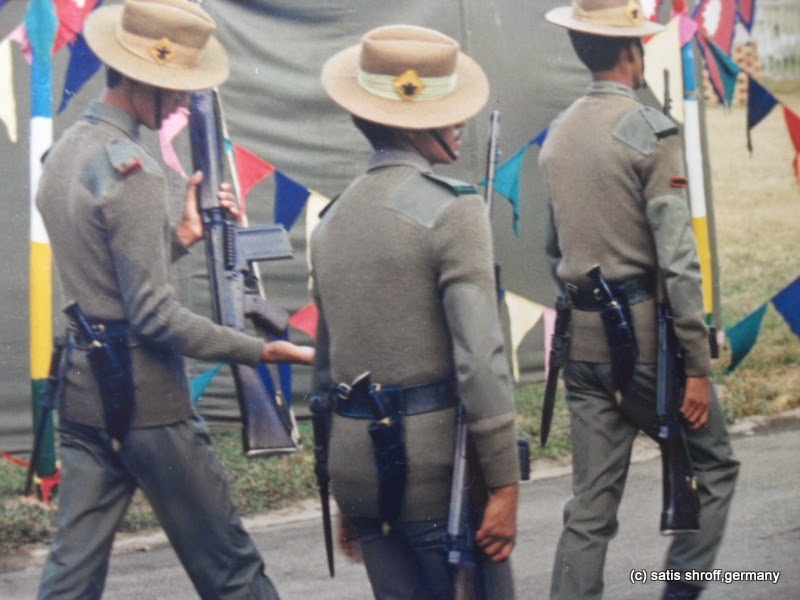|
THE LURE OF THE HIMALAYAS (Satis Shroff, Freiburg)
A long time ago near the town of Kashgar,
I, a stranger in local
clothes was captured
By the sturdy riders of Vali
Khan.
What was a stranger
With fair skin and blue
eyes,
Looking for in Vali Khan’s terrain?
I, the
stranger spoke a strange tongue.
‘He’s a spy sent by
China.
Behead him,’ barked the Khan’s officer.
I
pleaded and tried to explain
My mission in their
country.
It was all in vain.
On August 26, 1857
I,
Adolph Schlagintweit,
a German traveller, an
adventurer,
Was beheaded as a spy,
Without a trial.
I
was a German who set out on the footsteps
Of the
illustrious Alexander von Humboldt,
With my two brothers
Hermann and Robert,
From Southhampton on September
20,1854
To see India, the Himalayas and Higher Asia.
The
mission of the 29000km journey
Was to make an exact
cartography
Of the little known countries,
Sans
invitation, I must admit.
In Kamet we reached a 6785m
peak,
An elevation record in those days.
We measured the
altitudes,
Gathered magnetic, meteorological,
And
anthropological data.
We even collected
extensive
Botanical, zoological and ethnographic
gems.
Hermann and I made 751 sketches,
Drawings,
water-colour and oil paintings.
The motifs were Himalayan
panoramas,
Single summits, glacier formations,
Himalayan
rivers and houses of the natives.
I still see myself and
Hermann working
With our pencils, brushes daubed in
water-colours and oil,
Trying to capture the colours and
perspectives
Of the Himalayas.
Fond memories of Padam
valley, near the old moraine
Of the main glacier at Zanskar
in pencil and pen.
A view from Gunshankar peak 6023
metres,
From the Trans-Sutlej chain in aquarelle.
A
European female in oriental dress in Calcutta 1855.
Brahmin,
Rajput and Sudra women draped in saris.
Kristo Prasad, a 35
year old Rajput
Photographed in Benaras.
An old Hindu
fakir with knee-long rasta braids,
Bhot women from
Ladakh, snapped in Simla.
Kahars, Palki-porters from
Bihar,
Hindus of the Sudra caste.
A Lepcha armed with
bow and arrows,
In traditional dress up to his calves
And
a hat with plume.
Kistositta, a 25 year old Brahmin from
Bengal,
Combing the hair of Mungia,
A 43 year old Vaisa
woman.
A wandering Muslim minstrel Manglu at Agra,
With
his sarangi.
A 31 year old Ram Singh, a Sudra from
Benaras,
Playing his Kolebassen flute.
The monsoon,
And
thatched Khasi houses at Cherrapunji,
The rainiest place on
earth.
The precious documents of our long journey
Can
be seen at the Alpine Museum Munich.
Even a letter,
Sent
by Robert to our sister Matilde,
Written on November 2,
1866 from Srinagar:
‘We travelled a 200 English mile
route,
Without seeing a human being,
Who didn’t belong
to our caravan.
Besides our horses, we had camels,
The
right ones with two humps,
Which you don’t find in
India.
We crossed high glacier passes at 5500m
And
crossed treacherous mountain streams.’
My
fascination for the Himalayas
Got the better of me.
I
had breathed the rare Himalayan air,
And felt like
Icarus.
I wanted to fly higher and higher,
Forgetting
where I was.
My brothers Hermann and Robert left India
By
ship and reached Berlin in June,1857.
I wanted to
traverse the continent
Disregarding the dangers,
For von
Humboldt was my hero.
Instead of honour and fame,
My
body was dragged by fierce riders in the dust,
Although I
had long left the world.
My soul had raced with the
speed of light to Heaven
A Persian traveller, a Muslim with
a heart
Found my headless body.
He brought my remains
all the way to India,
Where he handed it to a British
colonial officer.
It was a fatal fascination,
But
had I the chance,
I’d do it again.
COMMENTS:
Thelma
Zaracostas: Hi Satis! Another read of this wonderful
poem,great to see you again.Australia9/6/2008 9:23:03
AM
Fanfare2000Beautiful words, though it would be great book
to write about, you should expand this and create a novel, it
would be a big time seller, I'm sure there is more to this
story than you have told so far.USA2/10/2008 4:09:42
thelma: I love this
poem, Satis, that is why I am reading it again and again all
will enjoy this very educational and very colourful
write!australia10/2/2007 11:13:38 AM
thelmaHi Satis
waiting for some more of your great poems in the meantime back
to read again one my favourites.australia9/8/2007 8:29:21
PM
Satis Shroff writes: Dear Thelma, Glad to know that you found The
Lure of the Himalayas colourful and educational. There was a
big exhibition about the three German Schlagintweit brothers.
And what I found even interesting was that a teacher from
Freiburg, named Joseph Sartorius, did the same journey with
his camera and photographed the sites of the paintings by the
three brothers mentioned in the poem. It was great to compare
the modern photographs with the original paintings.I want to
bring out my poems with the Himalayan photographs of Joseph
Sartorius.Have a nice day. Regards, satis Satis
Germany5/19/2007 10:43:04 AM
thelma zaracostas: This is a
wonderful read thank you for the journey into the life and
adventures of this amazing person up until now I had never
heard of him. Very colourful and educational.australia5/19/2007
7:44:10 AM
|




%2Bstefanheinz%2B2009.jpg)


No comments:
Post a Comment